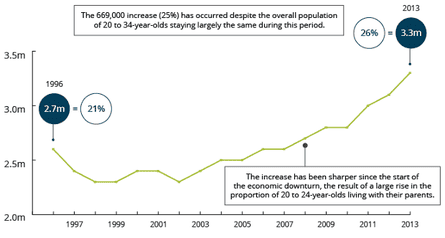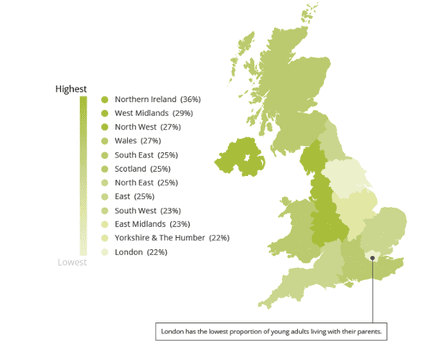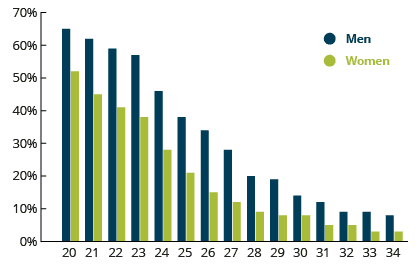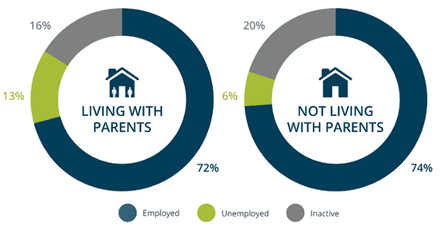British society is undergoing a significant shift as 1 in 4 young adults now live with their parents according to national statistics released on Tuesday. Those aged 20 to 34 are now more likely to be sharing a home with their parents than any time since 1996.
That's 3.3 million UK adults who are either unwilling or unable to live in a separate home from their parents. A closer look at the data from the Office for National Statistics reveals who is most likely to be in that 1 in 4.
A sharp and significant rise
Almost two decades ago, 21% adults aged 20-34 were living with their parents - 2.7 million people in the UK. Now, as 670,000 more individuals in that age bracket are in the same situation, that figure has risen to 26% of young adults.

Men more likely to be living with their parents
For every 10 women, there are 17 men aged 20 to 34 living with their parents. There are a few possible explanations for this wide gender gap:
- On average, young women are more likely to form relationships with men that are older than them and are therefore more likely to be living as part of a couple in their own household. (600,000 more women than men in this age group are cohabiting)
- Young women are also more likely to be lone parents in their own households (590,000 more women than men in this age group)
- Finally, young women are more likely than men to be studying in higher education - and move away from home to do so

Least likely in London
In the capital, the number of young adults living with their parents drops considerably to 1 in 5 while in Northern Ireland it is more than 1 in 3, well above the national average.
Those regional differences have existed since records began, despite the fact that they've grown more noticeable. In 1996, just 17% of 20-34 year olds in London lived with their parents while in Northern Ireland it was 33% - though the figures were lower back then, they still represented the country's high and low spots.

8% of 30 to 34 year olds still living with their parents
As adults get older, they're less likely to be living at home, though the figures for older age groups may come as a surprise. 14% of male 30 year-olds still live with their parents, a year later that percentage has fallen to 12%, then 9% before finally dropping to 8% for males aged 34.
The reasons for younger adults living with their parents may seem self evident but the statistics released still offer some explanations.
The first of these is that average earnings of adults rise steadily through their 20s and don't begin to level off until they are in their mid 30s, giving them additional means to leave the parental home. What's more, as age increases, so too does the likelihood young adults will be living with a partner - just 8% of people in the UK do at the age of 20, but by the time they're 31 years old, that rises to 70% of Britons.
Finally, the house price paid by first time buyers is now higher compared to their incomes. In 1996, the ratio of first home price to income was 2.7 to 1 - by 2013 it had risen to 4.4.

More likely to be unemployed
That house price problem is made all the more insurmountable by rising rates of short- and long-term unemployment. The percentage of young adults living with their parents who are unemployed is almost twice the unemployment levels found amongst those in the same group who don't live with their parents (13% compared to 6%).

How do we compare to our European neighbours?
Comparable figures for other countries are based on a slightly different age group - those aged 25 to 34. On that basis, the UK has the 7th lowest percentage of young adults living withe their parents out of 28 EU countries. The lowest rates were in Denmark where it was just 2%, compared to 68% in Croatia.
Aside from differing attitudes towards marriage and cohabitation, similar factors are put forward to explain the trends - from university attendance to incomes, unemployment and house prices. You can add your thoughts about the reasons for the British trends below the line.
Data summary
You can look at the regional trends below. To see a full breakdown for each year, each age group and gender, the data is available here.







Comments (…)
Sign in or create your Guardian account to join the discussion